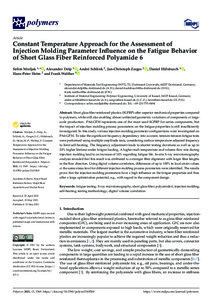Datum
2021-05-13Autor
Mrzljak, SelimDelp, AlexanderSchlink, AndréZarges, Jan-ChristophHülsbusch, DanielHeim, Hans-PeterWalther, FrankMetadata
Zur Langanzeige
Aufsatz

Constant Temperature Approach for the Assessment of Injection Molding Parameter Influence on the Fatigue Behavior of Short Glass Fiber Reinforced Polyamide 6
Zusammenfassung
Short glass fiber reinforced plastics (SGFRP) offer superior mechanical properties compared to polymers, while still also enabling almost unlimited geometric variations of components at large-scale production. PA6-GF30 represents one of the most used SGFRP for series components, but the impact of injection molding process parameters on the fatigue properties is still insufficiently investigated. In this study, various injection molding parameter configurations were investigated on PA6-GF30. To take the significant frequency dependency into account, tension–tension fatigue tests were performed using multiple amplitude tests, considering surface temperature-adjusted frequency to limit self-heating. The frequency adjustment leads to shorter testing durations as well as up to 20% higher lifetime under fatigue loading. A higher melt temperature and volume flow rate during injection molding lead to an increase of 16% regarding fatigue life. In situ X-ray microtomography analysis revealed that this result was attributed to a stronger fiber alignment with larger fiber lengths in the flow direction. Using digital volume correlation, differences of up to 100% in local strain values at the same stress level for different injection molding process parameters were identified. The results prove that the injection molding parameters have a high influence on the fatigue properties and thus offer a large optimization potential, e.g., with regard to the component design.
Zitierform
In: Polymers Volume 13 / Issue 10 (2021-05-13) eissn:2073-4360Zitieren
@article{doi:10.17170/kobra-202306168251,
author={Mrzljak, Selim and Delp, Alexander and Schlink, André and Zarges, Jan-Christoph and Hülsbusch, Daniel and Heim, Hans-Peter and Walther, Frank},
title={Constant Temperature Approach for the Assessment of Injection Molding Parameter Influence on the Fatigue Behavior of Short Glass Fiber Reinforced Polyamide 6},
journal={Polymers},
year={2021}
}
0500 Oax
0501 Text $btxt$2rdacontent
0502 Computermedien $bc$2rdacarrier
1100 2021$n2021
1500 1/eng
2050 ##0##http://hdl.handle.net/123456789/14836
3000 Mrzljak, Selim
3010 Delp, Alexander
3010 Schlink, André
3010 Zarges, Jan-Christoph
3010 Hülsbusch, Daniel
3010 Heim, Hans-Peter
3010 Walther, Frank
4000 Constant Temperature Approach for the Assessment of Injection Molding Parameter Influence on the Fatigue Behavior of Short Glass Fiber Reinforced Polyamide 6 / Mrzljak, Selim
4030
4060 Online-Ressource
4085 ##0##=u http://nbn-resolving.de/http://hdl.handle.net/123456789/14836=x R
4204 \$dAufsatz
4170
5550 {{Spritzgießen}}
5550 {{Glasfaser}}
5550 {{Polyamid 6}}
5550 {{Vehalten}}
5550 {{Materialermüdung}}
5550 {{Temperatur}}
5550 {{Tomografie}}
7136 ##0##http://hdl.handle.net/123456789/14836
<resource xsi:schemaLocation="http://datacite.org/schema/kernel-2.2 http://schema.datacite.org/meta/kernel-2.2/metadata.xsd"> 2023-06-16T11:55:26Z 2023-06-16T11:55:26Z 2021-05-13 doi:10.17170/kobra-202306168251 http://hdl.handle.net/123456789/14836 eng Namensnennung 4.0 International http://creativecommons.org/licenses/by/4.0/ fatigue testing X-ray microtomography short glass fiber polyamide 6 injection molding self-heating testing methodology digital volume correlation 600 Constant Temperature Approach for the Assessment of Injection Molding Parameter Influence on the Fatigue Behavior of Short Glass Fiber Reinforced Polyamide 6 Aufsatz Short glass fiber reinforced plastics (SGFRP) offer superior mechanical properties compared to polymers, while still also enabling almost unlimited geometric variations of components at large-scale production. PA6-GF30 represents one of the most used SGFRP for series components, but the impact of injection molding process parameters on the fatigue properties is still insufficiently investigated. In this study, various injection molding parameter configurations were investigated on PA6-GF30. To take the significant frequency dependency into account, tension–tension fatigue tests were performed using multiple amplitude tests, considering surface temperature-adjusted frequency to limit self-heating. The frequency adjustment leads to shorter testing durations as well as up to 20% higher lifetime under fatigue loading. A higher melt temperature and volume flow rate during injection molding lead to an increase of 16% regarding fatigue life. In situ X-ray microtomography analysis revealed that this result was attributed to a stronger fiber alignment with larger fiber lengths in the flow direction. Using digital volume correlation, differences of up to 100% in local strain values at the same stress level for different injection molding process parameters were identified. The results prove that the injection molding parameters have a high influence on the fatigue properties and thus offer a large optimization potential, e.g., with regard to the component design. open access Mrzljak, Selim Delp, Alexander Schlink, André Zarges, Jan-Christoph Hülsbusch, Daniel Heim, Hans-Peter Walther, Frank doi:10.3390/polym13101569 Spritzgießen Glasfaser Polyamid 6 Vehalten Materialermüdung Temperatur Tomografie publishedVersion eissn:2073-4360 Issue 10 Polymers Volume 13 false 1569 </resource>
Die folgenden Lizenzbestimmungen sind mit dieser Ressource verbunden:


